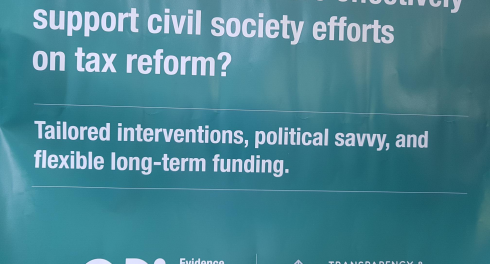This post is part of the Fiscal Futures blog series exploring some of the biggest issues that fiscal accountability enthusiasts are likely to encounter over the next 10 to 15 years. Learn more about the Fiscal Futures project and download resources here.
Topics such as fiscal policy, accountability, and fiscal justice do not usually generate sweeping media coverage. Fiscal issues are among the kinds of stories that media producers would probably rather leave to economists and academics, or NGOs specialized in this field. Why? Because these topics are complicated, not easy to break down, and hard to visualize – in short, they’re not “sexy” stories. For these and other reasons, journalists and the media have largely stayed on the fringe of fiscal accountability research. Yet recent exposés such as the Panama Papers show that the media can still make powerful contributions to the greater fiscal transparency cause. The question is whether, given current digitalization and ownership trends, the media can consistently rise to this challenge.
The “media” is a commercially driven industry and therefore has its own strengths, weakness, and idiosyncrasies. Let’s break down the “media” and look at journalism as the primary source of news. Journalism is still considered the intellectual backbone of today’s media industry, but like most other media products, journalistic products are considered content that has to sell, and therefore favors storytelling over — allegedly — dry facts.
Journalism usually only covers bits and pieces of fiscal issues and rarely covers the whole picture. Stories about corruption and other sorts of white-collar crime touch on one aspect of fiscal accountability, because obviously there is a market for that line of reporting. Beyond that, the business journalism niche covers complex topics like public budgets, tax, corporate finances, central banks, and the markets. However, this type of journalism is tailored to decision makers and professionals who work in these fields and understand the context and jargon. While business journalism covers fiscal decision making and public budgets, for example, these stories go mostly unnoticed by the larger audience.
There’s hardly anything in between those two approaches. Public budgets, public spending, or tax policies often seem to be a blind spot for mainstream reporting. Politicians often are not interested in advertising where public money goes, or how it is redistributed within the fiscal system, and journalists are often not chasing down that information.
Maybe too many media outlets have come to think that there is no merit in emphasizing that kind of coverage – because, supposedly, there is no larger market for it. As a New York Times columnist put it in a column called “Fiscal Ecstasy:” “Budget deliberations in Congress aren’t the most exciting topic in the universe.”
 Even though the work of investigative journalists conducting large cross-border investigations such as Luxleaks, the Panama Papers, or the Paradise Papers has led to increased attention on the kinds of stories that touch on fiscal accountability, journalists reporting on them inevitably face a certain dilemma. Audience is often measured digitally, and losing audience, no matter how important the story, can mean instant loss of revenue. Journalists increasingly have to ask themselves: how much detail can the audience be expected to digest? How much fiscal literacy is required to understand the topic? For example, can complex tax matters be broken down without losing the story’s meaning? In struggling with those questions, media has — more often than not — remained on the fringes of fiscal accountability rather than emphasizing it.
Even though the work of investigative journalists conducting large cross-border investigations such as Luxleaks, the Panama Papers, or the Paradise Papers has led to increased attention on the kinds of stories that touch on fiscal accountability, journalists reporting on them inevitably face a certain dilemma. Audience is often measured digitally, and losing audience, no matter how important the story, can mean instant loss of revenue. Journalists increasingly have to ask themselves: how much detail can the audience be expected to digest? How much fiscal literacy is required to understand the topic? For example, can complex tax matters be broken down without losing the story’s meaning? In struggling with those questions, media has — more often than not — remained on the fringes of fiscal accountability rather than emphasizing it.
Journalists might just be missing opportunities, but it’s not as if there haven’t been any wake-up calls. The most recent came in January 2019 but might as well have gone unheard. A Dutch academic, Rutger Bregman, spoke at the World Economic Forum in Davos, Switzerland, and made headlines by telling a room full of billionaires: “Want to fix the global economy? Then dig deeper. Pay up. Tax the rich.” One does not need to agree with his opinions, but he touched on an important fiscal issue that is a core problem in many countries that were represented in Davos: the so-called “top one percent” of the income pyramid do not pay taxes according to their wealth.
His passionate appeal went viral and drew lots of responses from a larger audience. Why? He made it personal. He challenged people face to face, pointing to a major lack in accountability, transparency, and fiscal justice. He gave injustice a face that, at the same time, made for good storytelling.
The lesson for future media reporting about fiscal accountability: make it personal! It’s important to note that journalists can do this without becoming campaigners or sacrificing their independence and credibility. Fiscal accountability is an abstract notion that is hard to associate with real tangible impact. However, a lack of fiscal accountability translates into a whole chain of tangible consequences: fiscal mismanagement, austerity, corruption, and poverty, just to name a few. And poverty, for example, does have a face. Millions of faces, to be exact, and behind those faces are millions of stories – personal and emotional ones that have winners and losers, fighters, heroes, and victims.
The stories needed to portray the big picture of the inner-workings of fiscal systems and their impact (“fiscal ecstasy”) that deliver exciting and in-depth insight are out there. They may have been dwarfed by other concerns, but that doesn’t mean they’re not there.
There’s another lesson we can take from Rutger Bregman’s viral success: don’t be afraid to chase down the root cause. In an age in which stories need to become short in order to attract the even shorter attention span of the audience, there is often too little time or space to mention and track down the causes of the problems being reported. That, too, has become a blind spot in many reporting formats. Finding and defining causes for fiscal opaqueness or lack of accountability may require a lot of effort to track down money or chase paper trails, and, eventually, people. This task might involve building new knowledge and making more use of sources and experts who deal with fiscal matters in various fields. But more than anything else, it might mean departing from the traditional agenda and overcoming old habits and blind spots in order to emphasize background, explanatory reporting, and the bigger picture instead of “news only.”
While the latter might seem tantamount to renouncing basic journalistic instincts, the effort is worth it — and it might not only be a “nice to have” — it might be a “must.” In times of enhanced skepticism regarding media, fake news, and an ongoing struggle against declining relevance of quality media reporting, what could be more relevant than shedding light on the public budgets that impact peoples’ lives, peoples’ tax bills, the public goods (roads, schools, hospitals) people use, as well as illicit financial flows which deprive citizens of the very same. While journalists face more and more challenges of press freedom in many countries and regions, it’s vital to remain relevant to their audiences and supporters.
The good news is it can be done, and has been done increasingly in recent years, particularly in cross- border investigations in which journalists are joining forces rather than competing with each other. With the backlash against democracy and anti-press sentiment growing, the need for investigations around issues like corruption and accountability continues to rise. Cross-border investigations have shown that if journalists join forces they can create momentum – even for complex matters and stories. The Panama Papers and Paradise Papers shifted public opinion on tricky issues like tax avoidance, corruption, and illicit financial flows. In the wake of the Panama Papers, heads of state had to resign, millions of unpaid taxes were recovered by states around the world, and tax offenders in many countries turned themselves in. Tax evasion is not considered a trivial offense anymore and tax havens — particularly in Europe — have suffered severe damages to their reputations when it became clear that they were instrumental in the industrial scale of abusive tax conduct.
However, there are substantial challenges ahead for the media. Revenues from advertising, a classic pillar of the business, are declining steadily and irrevocably in many countries around the world. Digitalization will continue to be disruptive and continue to change the face of journalism as well as distribution. Further concentration of media ownership will inevitably follow, which might curb journalists’ ability to serve the public interest and tackle issues such as fiscal accountability. Media integrity is at risk when media becomes more and more commercially driven, or when outlets are primarily loyal to sponsors, or even governments. Like any other industry, media needs healthy, market-based competition – which is eroding and will continue to do so.
Where does this leave us? If journalism is still “printing what someone else does not want printed” and “everything else is public relations,” as George Orwell is often quoted, tackling stories that grow out of fiscal injustice could well be a promising strategy and a way forward. Many recent leak-based financial investigations such as Swissleaks, Luxleaks, the Panama Papers, and the Paradise Papers drew fierce criticism – not from consumers of media, but from those who have been held accountable in the wake of ground-breaking revelations that came to light because of the media.
Petra Blum is an independent journalist working for WDR, a public broadcaster in Cologne, Germany. In 2015, she was part of the Swiss Leaks investigation, studying secret bank accounts and focusing on tax fraud. During the Panama Papers, Petra was part of the team which unearthed the hidden money of people closely associated with Russia’s head of state. During Paradise Papers, Petra helped unravel corruption cases in resource-rich countries like the Democratic Republic of the Congo.
This post first appeared on IBP site


